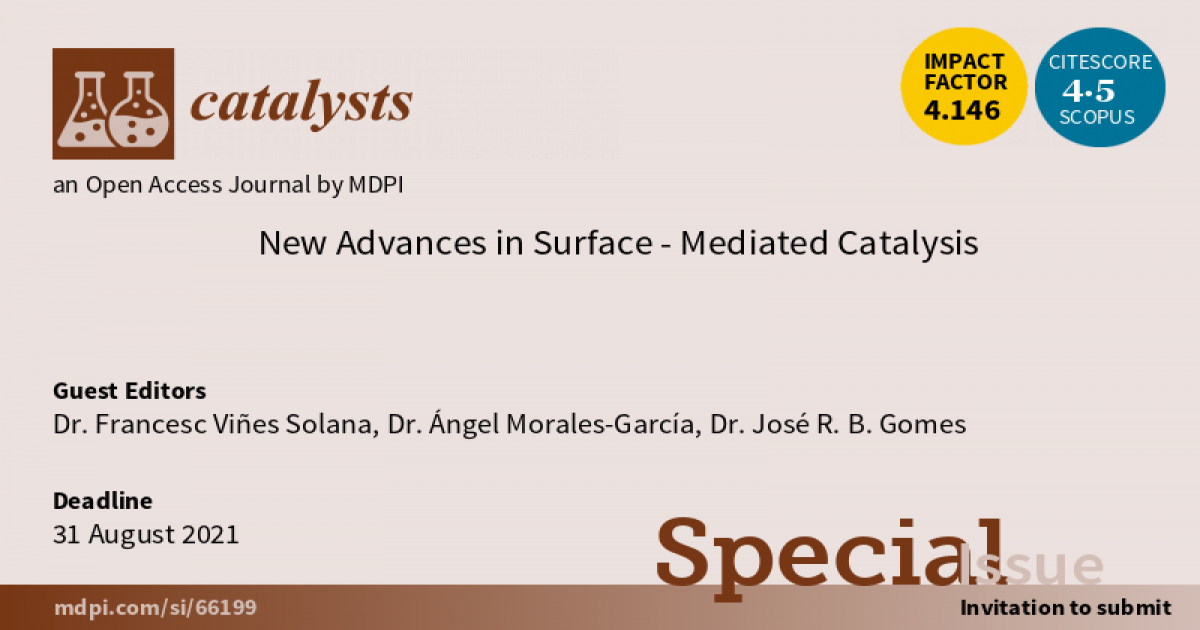New Advances in Surface-Mediated Catalysis
A special issue of Catalysts (ISSN 2073-4344).
Deadline for manuscript submissions: closed (31 August 2021) | Viewed by 1466

Special Issue Editors
Interests: heterogeneous catalysis; photocatalysis; electrocatalysis; CO2 activation and conversion; MXenes; metal nanoparticles; transition metal carbides; nanotechnology
Interests: biomass conversion; CO2 activation and conversion; MXenes; nanoparticles; photocatalysis; heterogeneous catalysis
Interests: molecular structure; gas-phase thermochemistry; gas-phase reaction profiles; adsorption (chemisorption and physisorption); surface reactions; heterogeneous catalysis; machine learning
Special Issues, Collections and Topics in MDPI journals
Special Issue Information
Dear Colleagues,
Advances in surface-mediated catalysis are needed in order to progress towards greener and more sustainable fabrication processes. In this respect, experimental and computational techniques have been widely employed to understand, in atomistic detail, the mechanisms of reactions occurring at catalytic surfaces. Over the last few years, we have been witnessing an increase in the complexity of the research being carried out, from ultra-high vacuum, very-low temperature, and single-crystal surfaces to more realistic conditions employing high-pressure/high-temperature and disordered substrates. Our understanding of how the operando conditions affect the catalytic surfaces and the mediated reactions is of utmost importance for designing stable, long-lasting, and more efficient catalyst surfaces, i.e., catalysts that can avoid the formation of unsought intermediates and products and can work under mild conditions.
This Special Issue aims to provide a complete account of recent advances in the utilization of state-of-the-art experimental and computational techniques to understand reactions occurring at catalytic surfaces. We welcome original research articles, short communications, mini-reviews, and perspective papers.
Dr. José R. B. Gomes
Dr. Ángel Morales-García
Dr. Francesc Viñes
Guest Editors
Manuscript Submission Information
Manuscripts should be submitted online at www.mdpi.com by registering and logging in to this website. Once you are registered, click here to go to the submission form. Manuscripts can be submitted until the deadline. All submissions that pass pre-check are peer-reviewed. Accepted papers will be published continuously in the journal (as soon as accepted) and will be listed together on the special issue website. Research articles, review articles as well as short communications are invited. For planned papers, a title and short abstract (about 250 words) can be sent to the Editorial Office for assessment.
Submitted manuscripts should not have been published previously, nor be under consideration for publication elsewhere (except conference proceedings papers). All manuscripts are thoroughly refereed through a single-blind peer-review process. A guide for authors and other relevant information for submission of manuscripts is available on the Instructions for Authors page. Catalysts is an international peer-reviewed open access monthly journal published by MDPI.
Please visit the Instructions for Authors page before submitting a manuscript. The Article Processing Charge (APC) for publication in this open access journal is 2200 CHF (Swiss Francs). Submitted papers should be well formatted and use good English. Authors may use MDPI's English editing service prior to publication or during author revisions.
Keywords
- heterogeneous catalysis
- electrocatalysis
- photocatalysis
- metals
- oxides
- 2D materials
- surface electronic properties
- spectroscopy
- diffraction
- microscopy
- computer simulation
- operando conditions
Benefits of Publishing in a Special Issue
- Ease of navigation: Grouping papers by topic helps scholars navigate broad scope journals more efficiently.
- Greater discoverability: Special Issues support the reach and impact of scientific research. Articles in Special Issues are more discoverable and cited more frequently.
- Expansion of research network: Special Issues facilitate connections among authors, fostering scientific collaborations.
- External promotion: Articles in Special Issues are often promoted through the journal's social media, increasing their visibility.
- Reprint: MDPI Books provides the opportunity to republish successful Special Issues in book format, both online and in print.
Further information on MDPI's Special Issue policies can be found here.







